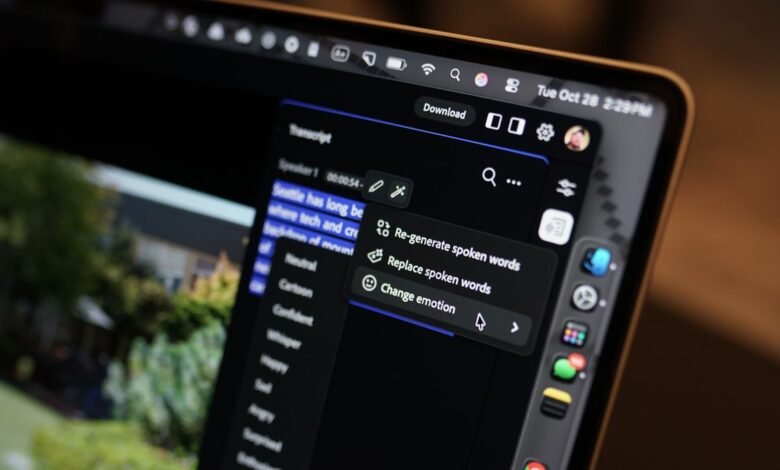Adobe’s AI Can Now Change the Emotion in Any Voice Recording

▼ Summary
– Adobe’s AI model analyzed a video and automatically generated sound effects based on scene content, such as an alarm clock and car door closing.
– The AI-generated sound effects had imperfections, including an unrealistic alarm sound and unnatural rustling during a hug scene.
– Adobe used a conversational interface to request specific sound effect changes, which the AI successfully implemented by finding scenes and placing sounds accurately.
– These experimental AI features are expected to become available in Adobe’s software suite around 2026, following the company’s pattern of integrating Sneaks demos.
– The announcement comes amid industry shifts toward AI in creative work, following recent voice actor strikes that secured AI consent and disclosure protections.
Adobe’s latest artificial intelligence demonstration showcases a powerful new capability for manipulating vocal emotion in any audio recording. During a recent presentation, researchers illustrated how their system can take a spoken phrase and completely transform its emotional tone, turning a neutral statement into one brimming with excitement, sadness, or anger while preserving the speaker’s unique vocal characteristics. This breakthrough represents a significant leap forward in audio manipulation technology that could fundamentally change how voiceovers, podcasts, and other audio content are produced.
The demonstration featured a simple voice recording where the AI successfully modified the speaker’s emotional delivery without altering the actual words being spoken. What makes this technology particularly impressive is its ability to maintain the original speaker’s voiceprint and speech patterns while injecting completely different emotional qualities. The system analyzes the acoustic properties of speech, including pitch, tempo, and timbre, then reconstructs the audio with the desired emotional characteristics seamlessly integrated.
This emotional voice technology isn’t yet available to the public, but Adobe typically introduces successful experimental features into their creative suite within a couple of years. The company’s annual Sneaks event has previously previewed other AI-powered tools that later became standard features in applications like Photoshop and Premiere Pro. Industry observers anticipate these voice emotion modification capabilities could become commercially available around 2026, following the company’s established pattern of developing and refining experimental technologies before public release.
The timing of this announcement comes during a period of significant transition for voice professionals. Video game voice actors recently concluded an extended strike that resulted in new protections regarding AI usage of their performances. The agreement now requires companies to obtain explicit consent and provide proper disclosure when recreating voice actors’ performances through artificial intelligence. Many in the voice acting community have been preparing for AI’s impact on their industry, and Adobe’s emotion-altering technology, even though it doesn’t generate entirely new voices, represents another milestone in the creative industry’s ongoing transformation through artificial intelligence.
(Source: Wired)





